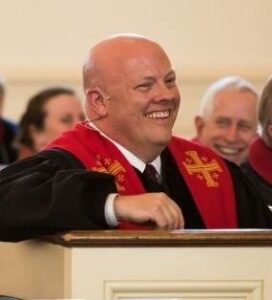A MESSAGE FROM THE REV. J.C. AUSTIN: IN THE SPIRIT OF ABUNDANCE
This Sunday marks the beginning of our congregation’s Stewardship season.
Now, if that news doesn’t inspire you to leap with joy, don’t worry:  you’re not alone. In fact, when I was going through the ordination process in the Presbyterian Church (USA), there were a battery of tests that you were required to take to help determine your mental, emotional, and vocational fitness to be ordained as a Minister of Word and Sacrament.
you’re not alone. In fact, when I was going through the ordination process in the Presbyterian Church (USA), there were a battery of tests that you were required to take to help determine your mental, emotional, and vocational fitness to be ordained as a Minister of Word and Sacrament.
One of them was called “Motivations for Ministry,” and it helped highlight the things that were most and least motivating you at the prospect of service as a pastor. There were at least a dozen categories, and they were all things that you would think of: preaching, teaching, pastoral care, administration, spiritual formation, etc. Well, my second-lowest motivation was evangelism, but the one I scored dead last on was…stewardship!
In fact, I was so ambivalent about it that I wasn’t sure I could really serve as a pastor. So, I decided I needed to focus on this whole idea of stewardship and money and giving in my studies, and I even wrote an optional senior thesis on the subject! Now, the irony of all this is that when I came back from a year in South Africa and was searching for a pastoral call, the one I finally accepted was at Madison Avenue Presbyterian Church in New York City, and my title was “Associate Pastor for Evangelism and Stewardship”!
Part of the reason that happened, I’m convinced, is that God has a good sense of humor. But the real reason I went from being completely unmotivated around stewardship (and evangelism) was not because I had a problem with the theological and Biblical substance of those ideas; it was because of how the church tends to actually think and talk about them.
Far too many churches approach stewardship through a theology of scarcity and obligation: “we don’t have enough money, so you need to give us what you can or we’ll have to cut the budget.” That, of course, is a terrible way to ask people to give, both practically and theologically.
Practically, nobody wants to give to help an institution balance its budget; even if you are deeply committed to the institution, what really gets you excited is not balancing the budget, but the difference they are making in the world. And theologically, God comes to us over and over in a spirit and ethic of abundance, not scarcity.
One of the main themes of Jesus’ ministry was about the abundance of God’s grace and of the life God intends for us, which he illustrated in everything from the parable of the sower who cast his seeds over every type of soil, just in case something might be able to grow, to the miracle of feeding the five thousand, in which Jesus saw hungry people and instead of sending them away to fend for themselves, multiplied a few loaves of fish and some bread into not only enough for everyone to eat their fill, but have twelve baskets of leftovers to carry away.
It is that kind of abundance that we are meant to hold up when we think about the resources that we have to support God’s mission through this church: an abundance of joy, of hope, of opportunity and possibility to serve God in remarkable ways in our church and in our community.
So that is what we will be talking about in this stewardship season, including through a sermon series I will be giving on some of the most important actions that we can take as Christians in our journeys of faith (this Sunday begins with the action of “Going”). I am excited about this season to explore and celebrate what God is up to among us, and I hope you will be too!
Grace and Peace,
J.C.
